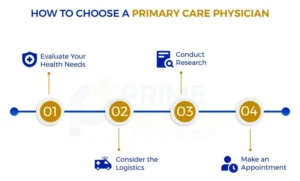Your Annual Check-up at FirstPoint MD: More Than Just a Routine

In today’s fast-paced world, maintaining good health is more challenging than ever. With the hustle and bustle of daily life, it’s easy to neglect our health until issues arise. However, the importance of regular check-ups cannot be overstated. Regular visits to your primary care provider play a crucial role in early detection and prevention of various health conditions, ensuring that you can lead a healthier, longer life.
At FirstPointMD, located in Floral Park, NY, we understand the significance of preventive healthcare. As your trusted primary care provider, we are committed to offering comprehensive health services that prioritize early detection and preventive care. In this article, we will explore the many benefits of regular check-ups and why they are essential for your well-being.
Understanding Regular Check-ups
A regular check-up, often referred to as a wellness visit, is a routine examination that assesses your overall health status. These check-ups typically include a review of your medical history, a physical examination, and a series of tests and screenings tailored to your age, sex, and medical history.
The frequency of these check-ups depends on various factors, including your age, existing health conditions, and risk factors. For example, adults between the ages of 18 and 40 may only need a check-up every two years, while those over 40, or individuals with chronic conditions, might require annual visits.
What Constitutes a Regular Check-up?
A typical check-up includes:
Physical Examination: Your doctor will examine your body to check for any signs of illness. This may include looking into your eyes, ears, and throat, listening to your heart and lungs, and palpating different areas of your body.
Vital Signs Monitoring: This involves checking your blood pressure, heart rate, respiration rate, and temperature. These vital signs provide crucial information about your overall health.
Laboratory Tests: Depending on your health status, your doctor might recommend blood tests, urine tests, or other laboratory work to monitor key health markers.
Imaging Tests: Sometimes, X-rays, ultrasounds, or other imaging studies are required to get a clearer picture of your internal health.
Frequency and Types of Medical Check-ups
Regular check-ups can be categorized based on their frequency and purpose:
Annual Check-ups: These are recommended for most adults to ensure ongoing health and early detection of potential issues.
Biannual or Quarterly Check-ups: For individuals with chronic health conditions, more frequent visits might be necessary.
Age-specific Screenings: Certain check-ups are more common at specific life stages, such as pediatric visits, adult health screenings, and geriatric assessments.
Why Early Detection Matters
Early detection of health issues can significantly alter the course of treatment and improve outcomes. Many diseases, such as cancer, diabetes, and heart disease, can be managed more effectively if caught in the early stages. For instance, detecting high blood pressure early can prevent heart attacks or strokes, while early diagnosis of diabetes can help manage the condition and avoid complications.
The Concept of Early Detection
Early detection means identifying a disease or condition before symptoms become apparent. This is typically achieved through regular screenings and tests during your check-up. Early detection often leads to easier, less invasive treatments and better overall outcomes.
Examples of Conditions Detectable in Early Stages
Cardiovascular Diseases: High blood pressure, high cholesterol, and early signs of heart disease can often be detected during routine check-ups.
Diabetes: Blood tests can reveal early signs of diabetes, allowing for dietary and lifestyle changes that can prevent the condition from progressing.
Cancer: Screenings for breast, cervical, prostate, and colorectal cancers are essential as they can detect cancer at a stage where it is more treatable.
Benefits of Regular Check-ups
The benefits of regular check-ups extend far beyond just early detection. They include:
1. Detecting Health Issues Early
Early detection is key to effective treatment. Regular check-ups help identify health issues before they become severe, allowing for timely intervention.
2. Reducing Healthcare Costs
By catching potential health problems early, you can avoid the high costs associated with treating advanced diseases. Preventive care is often more affordable than treating diseases after they develop.
3. Enhancing Quality of Life
Regular check-ups contribute to a higher quality of life by preventing diseases that can lead to long-term complications. By staying healthy, you can enjoy life to the fullest without the burden of chronic illness.
4. Building a Strong Doctor-Patient Relationship
Consistent visits to your primary care provider help build a trusting relationship. This trust is crucial for effective communication and personalized care, ensuring that your doctor understands your unique health needs and concerns.
Common Components of a Regular Check-up
Physical Examinations
A thorough physical exam is the cornerstone of a regular check-up. During this exam, your doctor will check your body for signs of disease, including examining your skin, eyes, ears, nose, throat, and extremities.
Vital Signs Monitoring
Monitoring vital signs is a routine part of any check-up. These signs provide critical information about your overall health and can indicate the early stages of conditions like hypertension or respiratory issues.
Laboratory Tests and Imaging
Lab tests can reveal a wealth of information about your health, from blood sugar levels to kidney function. Imaging tests, like X-rays or ultrasounds, might be necessary to investigate further if your physical exam or lab results indicate potential issues.
Common Conditions Detected Through Regular Check-ups
Cardiovascular Diseases
Regular monitoring of blood pressure, cholesterol levels, and heart function can help detect early signs of cardiovascular diseases, enabling timely treatment and lifestyle changes to prevent heart attacks and strokes.
Diabetes and Metabolic Disorders
Blood tests during check-ups can reveal high blood sugar levels, indicating prediabetes or diabetes. Early intervention can prevent the progression of these conditions.
Cancers (Breast, Prostate, Colon)
Routine cancer screenings, such as mammograms, colonoscopies, and PSA tests, are vital for detecting cancers at an early, more treatable stage.
Respiratory and Pulmonary Conditions
Lung function tests and chest X-rays can detect respiratory issues such as asthma, COPD, or early signs of lung disease, ensuring that treatment begins before the condition worsens.
Conclusion
Regular check-ups are a vital component of maintaining good health. By prioritizing early detection and prevention, you can reduce your risk of serious health conditions, improve your quality of life, and save on healthcare costs in the long run. At FirstPointMD in Floral Park, NY, we are here to support your health journey with comprehensive primary care services tailored to your needs. Don’t wait—schedule your next check-up today and take the first step toward a healthier future.






